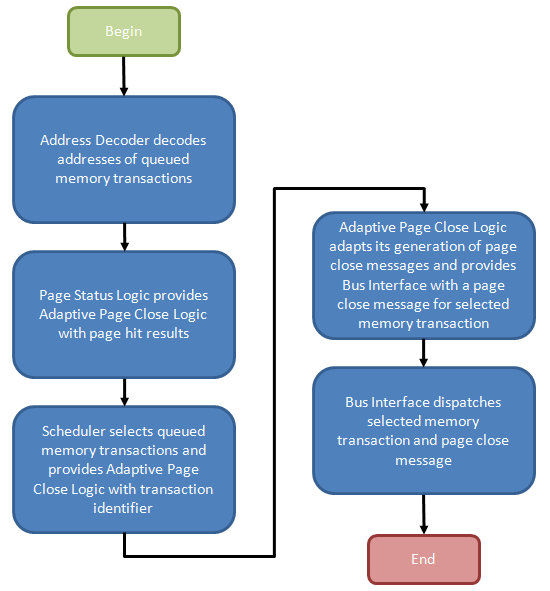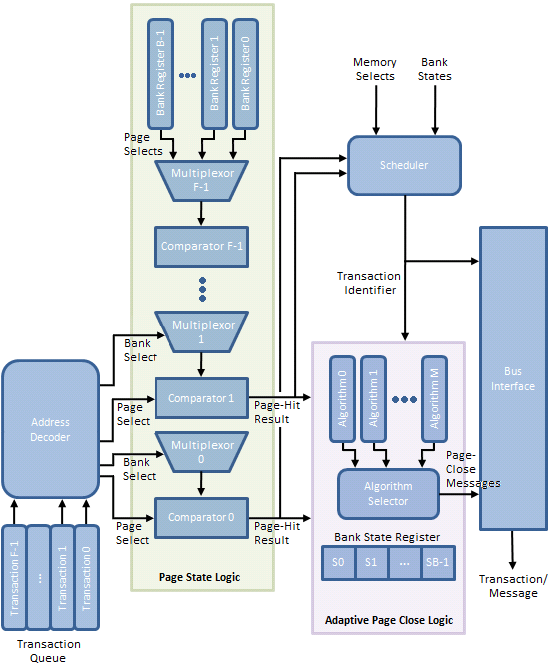Everything You Always Wanted to Know About SDRAM (Memory): But Were Afraid to Ask
by Rajinder Gill on August 15, 2010 10:59 PM ESTWhat do you mean you've never heard of Adaptive Page Management (APM) Technology? Well, that must be because Intel Marketing doesn't seem to feel the need to bring it up.
Simply put, Intel's APM determines, based on the potential implications of pending memory transactions, whether closing open pages, or allowing them to remain open longer may be beneficial to overall memory performance. In response, the memory controller may (or may not) elect to issue commands to close pages, depending on the programmed operation.
Figure 10 provides the general flow of events required to manage such a process. In our explanation we intend to introduce you to all known register settings needed to adjust the functional control policy, but first we need to detail the necessary actions, and purpose, of the design elements that make up such a mechanism. A better understanding of the underlying logic will pay dividends as you attempt to dial in measurable performance improvements through experimentation.
Per Figure 11, the Transaction Queue stores memory transactions generated by the processor. Unlike a typical First-In-First-Out (FIFO) queue with a tail, into which memory transaction may be pushed, and a head, from which memory transactions may be popped, this transaction queue is a plurality of storage elements allowing single memory transactions to be removed from the list and dispatched toward the memory in a different ordering than when originally added to the queue.

Command re-ordering can improve perceived memory performance by grouping together reads/writes to a common physical page in memory, saving the time that would otherwise be needed to later re-open the same page, should a concurrent access to the same bank force it to close early. After all, the minimum delay between sequential accesses to the same open page is equal to the CAS Latency (CL or tCAS) of the device. Accessing a bank (opening a page) increases the latency of the post-interleaved operation by the Row-Column (or Command) Delay (tRCD), approximately doubling the effective data access time.
One should also appreciate that there are varying degrees of freedom when shuffling transactions in time. Like in the case of a read and write to the same memory location: the memory controller would be disallowed from moving the dependent read either ahead of or behind the associated write as the ordering must be implicitly maintained or coherency will be lost.
The Address Decoder partially decodes the memory transactions stored in the Transaction Queue as needed to determine the bank and page selected by each queued request. From there, the Bank Select messages control the multiplexers used to input the contents of a Bank Register to a comparator used to check if the selected page was also the most recently opened page for that bank (as such, each Bank Register is large enough to store n bits where each bank comprises 2n pages). A match results in the creation of a Page-Hit Result message.

Triggered by the Page State Logic, the Scheduler fetches pre-identified queued memory transactions for re-ordering based on the Memory Selects (both bank and page) and the associated Page-Hit Results. An array of Bank State Registers track actions performed upon each bank by storing a state-word indicating, among other things, whether the Adaptive Page Close Logic decided to close the bank in response to a previous memory transaction to the same bank.
Finally, based on the policy instantiated by the Algorithm Selector, a Page-Close Message either is or is not generated based on the same Page-Hit Results, Bank State Registers, and Bank/Page Selects in an effort to increase the number of subsequent page-hit accesses and/or decrease the number of page-miss accesses.
An immediate and tangible gain is achieved for every successfully re-ordered transaction as a page-hit access is more efficient than a page-empty, or at worst, a page-miss. This is always the case with Core i7 and is one of this architecture's well known shinning points. Switch off Adaptive Page Management (disable Adaptive Page Closing in BIOS) and this is where the process ends. The page may stay open for some finite time or it may be closed right away; we're not sure as there's really no way to know without some inside help.
The Adaptive Page Close Logic must now decide whether to collect all winnings, and close the page, or let it ride, and leave it open just a while longer. While another page-hit access may yield further gains, "guessing" wrong will cause a costly page-miss access in place what would have been just a page-empty access. If only there were some way the system could measure the effectiveness of previous close decisions and then adjust policy to fit...
Surprise! The Page Manager - made up of the Page State Logic, Adaptive Page Close Logic, and Scheduler - does exactly this. How this effectiveness is measured, and how the result of that evaluation is used to adapt the decision-making process is our next topic of discussion.










46 Comments
View All Comments
mupilot - Monday, August 16, 2010 - link
Nice article, its very in depth, but easy to read! I'll have to read through a couple times if I truly want to understand how my memory works so I can actually understand what I'm doing when I overclock my memory and adjust the timings.Cool Mike - Monday, August 16, 2010 - link
I find memory a bit confusing. What type of memory would be best (or even work) on an AMD system - for example the Asus M4N98TD EVO. Will the lower voltage modules work? I'd like to get some pretty decent memory, but almost all of the discussions are around Intel based chipsets. Any help would be appreciated.vajm1234 - Monday, August 16, 2010 - link
---- well i too wanna see a comparison how AMD works against the intelPrinceGaz - Monday, August 16, 2010 - link
Whilst the text for the Mistake Counter is incorrect, the bit count in the table does match the text-- the PARAMS2 register holds the 9, not 8 MSBs of each parameter (the internal values being 13 bit, not 12 bit), and the text and diagram both agree on this.PrinceGaz - Monday, August 16, 2010 - link
Oh and by the way, thankyou for an extremely informative article which has refreshed (hehe) and added to what I knew about how RAM operates and the effects of the main timings.Icepop66 - Monday, August 16, 2010 - link
Thanks for touching on some of the important aspects of sdram architecture and function and how they're related. My understanding is better now. Thanks for consistently good articles and reviews.Gary Key - Monday, August 16, 2010 - link
Rampage III Extreme -BIOS 0878 -
1. Opened Memory Timing Selections for Ultimate Tweaking
2. General Performance Enhancements for Overclocking
3. AnandTech Memory Article BIOS - Support provided by ASUS USA Tech Support (that would be me).
http://www.mediafire.com/?850dsymmc9j7jdd
lowenz - Monday, August 16, 2010 - link
Simply AWESOME article!Muhammed - Monday, August 16, 2010 - link
You didn't mention the fact that (for example) DDR3 1600MHz actually works @200 MHz , and by fetching 8-bits per clock , it can effectively work like a 1600MHz RAM .DDR2 @800 MHz , actually works at 200MHz too but fetching 4-bits per clock .
DDR@400 MHz , actually works at 200MHz too , fetching 2-bits per clock .
MrBrownSound - Monday, August 16, 2010 - link
Thank you for helping me understand. Yes I was afraid to ask, or maybe I just felt I didn't need to know. I was wrong.